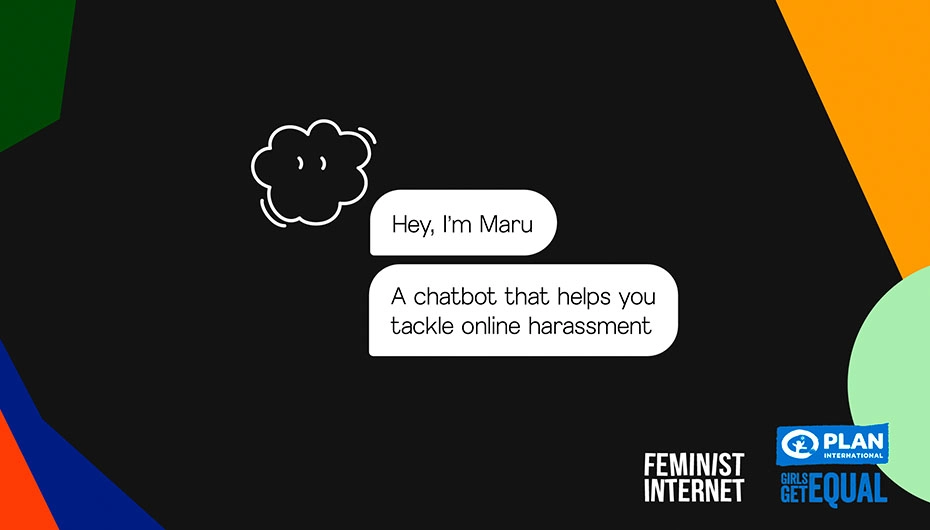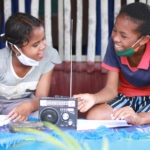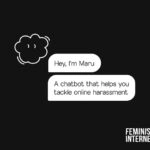Media Centre - Media release - 25 November 2020
New Maru chatbot to tackle online harassment faced by girls

Created by activists worldwide, the digital tool builds on Plan International’s landmark research revealing that nearly half (42%) of girls lose self-esteem or self-confidence, or feel mentally or emotionally stressed after being exposed to online harassment.
(MELBOURNE): ‘Maru’, an anti-harassment chatbot designed by young people for young people to address abuse on social media, has launched today in a collaboration between girls’ rights organisation Plan International and technology collective Feminist Internet.
The chatbot is designed to support girls and women who are experiencing, witnessing or tackling online harassment by providing real advice and resources from experts and activists. Maru users engage in a conversation with the chatbot, which has a series of language responses that offer advice on:
- reporting mechanisms,
- staying safe online
- links to resources.
The Maru chatbot is a continuation of Plan International’s work shining a light on the harassment and abuse girls and young women face on social media. In the organisation’s landmark survey on online abuse – including 14,000 girls from 22 countries – more than half (58%) revealed that they had been harassed or abused online.
The survey revealed that online harassment is worse than the global average in Australia, with 65% of girls and young women aged 15-25 reported having been exposed to a spectrum of online violence.
- Susanne Legena, CEO of Plan International Australia, said
“We know from our research that online abuse dents girls’ self-confidence, but it can go even further than that. Online violence has led to nearly one in five (19%) of those who have been harassed stopping or significantly reducing their use of the platform on which it happened. In this way, girls’ voices are being silenced.”
Elizabeth Payne, Plan International Australia youth activist, said: “I love that Maru the chatbot is designed to support you in whatever decision you make, whether you choose to report, or simply want to seek support resources. The design is really user friendly, uses gender neutral language, and provides the sort of responses you actually want to receive when seeking advice for online harassment.
“This tool is a perfect example of what social media companies should have in place to deal with the online harassment experienced by women and girls particularly. If they are serious about getting on board to stop online harassment I want to see them engaging with the designers and developing a plan to start implementing this now.”
Plan International collaborated with Feminist Internet on a series of multilingual workshops with young activists around the world to design a creative tool to address the issue of online harassment. This process brought together young activists from Benin, Ghana, Cameroon, Nepal, South Africa and Germany who are passionate about promoting internet freedom and safety.
Sarah Carson, Plan International’s Head of Campaigns, said: “Shutting girls out of online spaces is disempowering, limiting girls’ potential to thrive and become leaders. We created Maru at the height of this pandemic, to help provide vital support to girls facing and witnessing online harassment.”
Maru means ‘cloud space’ in Sesotho – a name chosen by one of the activists.
Sessi, one of the youth co-creators from Benin, said: “We showed people the problems we face online and in our lives, then we offered a solution: Maru. We all have different backgrounds and contexts, but think Maru will be appreciated across all contexts for its fluid and functional experiences.”
Charlotte Webb, Feminist Internet Co-founder, said: “The youth activists who co-designed Maru were an inspiration and it was incredible to work with them on such a creative response to the increasing problem of online harassment.
“They provided us with a concept and direction that reflected their real concerns about harassment and steered the conversation design so that Maru would speak to a global community.
“It is so exciting to see technology development being guided by feminist design principles to help make the internet a safer place for everyone.”
When creating the chatbot, Feminist Internet encouraged the youth activists to make sure:
- Language used was empathetic and inclusive
- Maru represents global perspectives
- Barriers people may face in accessing Maru have been addressed
- Maru’s appearance doesn’t reinforce stereotypes.
Another of the co-creators, Arouna from Cameroon, said: “Girls and women need to feel safe when they are on social networks. Gender-based violence against them on digital platforms must be condemned.”
The Swedish brand Monki, a long-term corporate partner of Plan International, will be supporting the launch of Maru, through hosting an Insta Live with a young activist involved in its creation on the 3rd December, 1pm CET @planinternational
Chat to Maru here.
Plan International Australia youth activist Elizabeth Payne or CEO Susanne Legena are both available for interview on request.
For more information, please contact:
James Norman
Plan International Australia Media and Ambassador Manager
Mobile: 0451 291 775
NOTES TO EDITORS
Maru
- Maru is currently only available in English, but there are plans for it to be translated in the near future.
- The young activists who took part in the creation of Maru are diverse and intersectional, majority people of colour, with two men and four women, including one transwoman.
Freedom Online
- Plan International’s Freedom Online research was carried out as part of Girls Get Equal, the organisation’s global campaign for a world where girls and young women have the power to be leaders and shape the world around them.
- As part of the campaign, girls around the world have written an open letter to Facebook, Instagram, TikTok and Twitter calling on them to create stronger and more effective ways to report abuse and harassment. Almost 60,000 people have signed the Open Letter so far.
- Following the launch of the #FreeToBeOnline campaign, Instagram has agreed to team up with girl activists from around the world to address online harassment. This will be done through a series of Girls Get Equal Listening Sessions bringing together girl activists in direct conversation with Instagram. These insights will also be shared with Facebook and WhatsApp.
- Plan International is also asking governments worldwide to implement specific laws to deal with online gender-based violence and ensure girls who suffer it have access to justice.
16 Days of Activism
- Plan International and Feminist Internet are launching Maru as part of the 16 Days of Activism Against Gender-Based Violence.
- The 16 Days of Activism against Gender-Based Violence is an annual international campaign that kicks off on 25 November, the International Day for the Elimination of Violence against Women, and runs until 10 December, Human Rights Day. It was started by activists at the inaugural Women’s Global Leadership Institute in 1991 and continues to be coordinated each year by the Center for Women’s Global Leadership. It is used as an organizing strategy by individuals and organizations around the world to call for the prevention and elimination of violence against women and girls.
About Plan International Australia
Put simply, we’re the charity for girls’ equality. We tackle the root causes of poverty, support communities through crisis, campaign for gender equality, and help governments do what’s right for children and particularly for girls. We believe a better world is possible. An equal world; a world where all children can live happy and healthy lives, and where girls can take their rightful place as equals.
Media contacts


